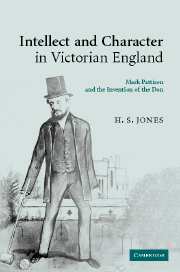1 - ‘No history but a mental history’
from PART I - LIVES
Published online by Cambridge University Press: 02 March 2010
Summary
‘The existence of an autobiography’, Friedrich Hayek once speculated, ‘may be the cause of our knowing less about its subject.’ Certainly the student of Pattison's career has to address the difficult question of how to construct a biographical account that makes proper use of his own testimony as an authority, while at the same time reading it critically and probing its limitations. The same problem has confronted biographers of other famous autobiographers, from St Augustine to Mill. Augustine's most recent biographer has observed that if we are to understand his life we need to avoid the snares he has laid for posterity, but also to respect his own version of the story. ‘If we will wring a real confession or two from him against his will, we must first listen to the story he wants to tell us.’ This is wise counsel that can be applied to other subjects too. Both Mill and Pattison were intellectuals who wrote their autobiographies as histories of a mind, and it is for that reason that their autobiographies present peculiar problems for later historians. Reading autobiographies critically is an everyday task for the historian, who has to address not only the fallibility of memory but also the desire of their subjects to present their own lives in the most favourable possible light and so to weave webs of myth in which later generations have become entangled.
- Type
- Chapter
- Information
- Intellect and Character in Victorian EnglandMark Pattison and the Invention of the Don, pp. 15 - 63Publisher: Cambridge University PressPrint publication year: 2007



